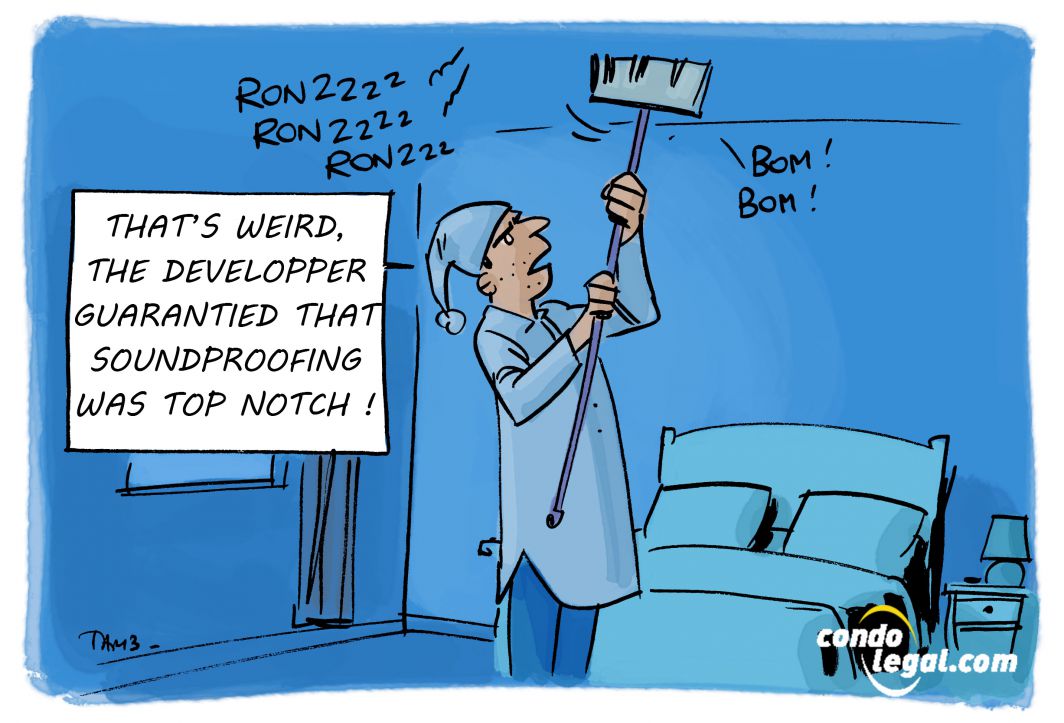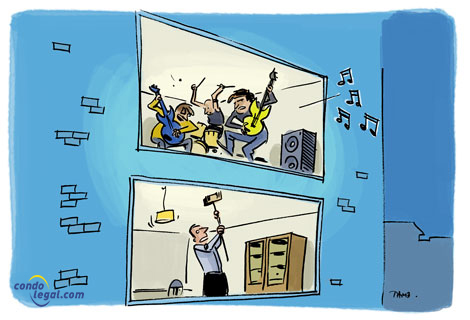
You have just purchased your new condo, and for some time now, you’ve been hearing noise that prevents you from peacefully enjoying your unit, or even completely disrupts your sleep. You ask your neighbors, and they are facing the same issue. Noise can cause stress, frustration, fatigue, and even lead to illness. This problem impacts your quality of life and could eventually compromise your psychological and physical well-being. It is crucial to act quickly to preserve peace and harmony within your co-ownership. What steps can you take to address this issue and restore tranquility?
Step 1: Where does the noise come from?
First of all, it will be necessary to determine the source of the noise. This step will help you identify the appropriate remedy.
When the noise comes from:
From a neighbor
It is important to differentiate between constant and excessive noise and normal neighborhood inconveniences. Article 976 of the Civil Code of Quebec provides:
" Neighbours shall suffer the normal neighbourhood annoyances that are not beyond the limit of tolerance they owe each other, according to the nature or location of their land or local usage."
In other words, the person who has chosen to live in a condominium must expect to hear certain noises from the daily life of his neighbors living in the Building. It is important to note, however, that these noises must not become unbearable.
In the event that a co-owner considers legal action against his neighbor because of the noise, he must show that this nuisance from the neighbor is abnormal and that it exceeds the limits of tolerance.
In order to determine whether the inconveniences the person is experiencing are normal, the courts will use the reasonable person analysis. This means that the judge will consider whether a reasonable person in the same situation considered the inconvenience to be abnormal.
Two factors of jurisprudential origin are added to this analysis, namely:
Deficient soundproofing of the building
First of all, it is appropriate to check the cause of this inadequate soundproofing.
Indeed, it could be a deficient soundproofing of the building due to the choice of materials used during construction or a change in the unit of a co-owner.
Regarding this second hypothesis, let's take the example of a co-owner who would decide to remove the carpet from his unit in order to install a hardwood floor. This change made by the co-owner will likely have a direct impact on the noise caused by residents' movements in this unit.
It would therefore be important in such a situation, to check whether this co-owner was duly authorized to carry out this work, in particular by checking the Declaration of Co-ownership or by asking the Board of Directors.
Step 2: The declaration of co-ownership
Whether it is noise caused by a neighbor or by a deficient soundproofing, the declaration of co-ownership remains above all the reference when a co-owner wants to know the rights and obligations of each.
It would therefore be appropriate to analyse it in order to know whether it contained provisions that would deal specifically with excessive noise.
The declaration of co-ownership could also contain a penalty clause that would provide that if not respected, the co-owner is liable to a fine.
Step 3: Private dispute prevention and resolution process
To stop the noise damage, it is necessary to favor the amicable settlement: meet the author of the nuisances to inform him of the inconveniences suffered. If this is not enough, it is necessary to send him a simple mail, then registered with acknowledgment of receipt. When a problematic situation arises, the best option is often to approach the person concerned directly to let him know.
It goes without saying that community life requires patience and tolerance on the part of each co-owner, in order to find common ground during a conflict situation.
Although this option is ideal for maintaining good neighbourliness, it may be useless when the co-owner at fault refuses to cooperate.
The vast majority of municipalities have adopted noise regulations that aim to ensure public tranquility.
These regulations generally specify the limits that citizens must respect under penalty of a fine.
A co-owner who considered that the noise had become intolerable could appeal to the police. The latter may notify the problematic co-owner or issue a fine if they have themselves witnessed the noise caused by this co-owner.
While municipal regulations remain useful, it is important to exercise good judgment before calling on the police.
Another alternative would be to notify the members of the board of directors.
Indeed, they could approach the co-owner at fault by reminding him of his obligations as a resident of the building.
In addition, when it comes to noise from a modification made by a co-owner, the board of directors will be able to ensure that the co-owner had actually obtained the necessary authorizations before the work was carried out.
In the case of deficient soundproofing, the Board of Directors may need to undertake work to correct the situation.
Step 4: Resort to mediation or arbitration
Some declarations of co-ownership include mandatory mediation clauses. This process requires co-owners and the board of directors to submit disputes to a mediator, often a lawyer or notary, in a neutral setting to find a satisfactory resolution.
If mediation fails, some declarations mandate arbitration. In this case, an arbitrator, usually mutually agreed upon, will resolve the dispute. Requests presented to the arbitrator may be similar to those filed in court, such as stopping the nuisance or seeking damages. The arbitrator's decision is final and binding, except in exceptional cases permitting limited appeals.
Step 5: Pursue legal action (As a last resort)
If no mediation or arbitration clause exists and amicable solutions fail, judicial recourse may be an option. Before proceeding:
Conclusion
Finally, although several remedies are available, it is still preferable, before buying the condo, to carry out a due diligence. Indeed, talking with the co-owners of the adjacent units or above, and reading the minutes can be an approach that will save you time and money. This audit will allow you to make a more informed decision about the purchase of your new condo.
Chronic express the personal opinions of the author and in no way engage the responsibility of the site editor, CondoLegal.com Inc. The content and opinions expressed in a column are those of the author.

17/09/2024

01/01/2024

21/05/2020

24/12/2024
